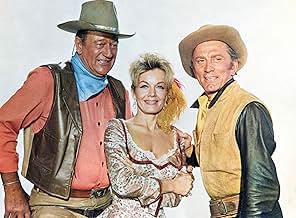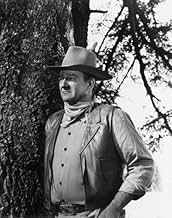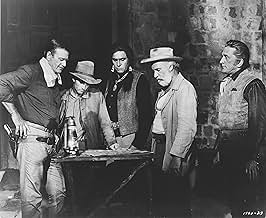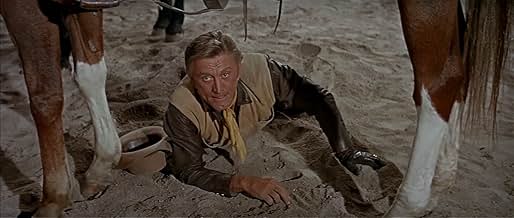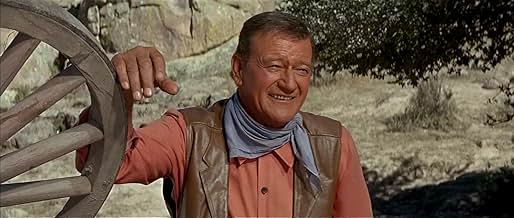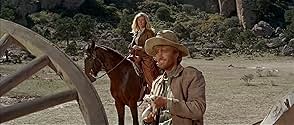CALIFICACIÓN DE IMDb
6.8/10
12 k
TU CALIFICACIÓN
La historia de un hombre que fue disparado, robado y encarcelado que regresa para robar un gran cargamento de oro del hombre que le hizo daño. El oro es transportado en un vagón blindado.La historia de un hombre que fue disparado, robado y encarcelado que regresa para robar un gran cargamento de oro del hombre que le hizo daño. El oro es transportado en un vagón blindado.La historia de un hombre que fue disparado, robado y encarcelado que regresa para robar un gran cargamento de oro del hombre que le hizo daño. El oro es transportado en un vagón blindado.
- Premios
- 1 premio ganado en total
Robert Walker Jr.
- Billy Hyatt
- (as Robert Walker)
Emilio Fernández
- Calita
- (as Emilio Fernandez)
Boyd 'Red' Morgan
- Early
- (as Red Morgan)
Opiniones destacadas
Framed ex-con/rancher Taw Jackson (John Wayne) is out for revenge. He plans to steal the title vehicle and $500,000 in gold, which belongs to Frank Pierce (Bruce Cabot), the man who framed him and stole his land. To help him carry out his plan, Jackson recruits gunfighter Lomax (Kirk Douglas); Levi Walking Bear (Keel); explosives expert Billy Hyatt (Robert Walker Jr.); and inside man Wes Catlin (Keenan Wynn). Nothing goes exactly as planned, and there are enough twists and turns along the way to keep the film from being a bore.
Keel walks off with the acting honors with his parody of the Indian sidekick of the hero. Wynn yells like he's being paid by the decibel. Walker Jr. is sincere and occasionally funny. Douglas and Wayne's scenes together play like duels to see who can steal the scene.
This film boasts one of Dimitri Tiomkin's last scores. William Clothier (photographer of 1960's "The Alamo" and 1964's "Cheyenne Autumn") did the very good cinematography. This is not one of either Wayne's or Douglas' best, but it is good enough to warrant a watch. Made by Universal, this is one of the few pre 1970 (heck, pre 2000 for that matter) films of any genre that AMC (Always More Commercials) still plays.
Keel walks off with the acting honors with his parody of the Indian sidekick of the hero. Wynn yells like he's being paid by the decibel. Walker Jr. is sincere and occasionally funny. Douglas and Wayne's scenes together play like duels to see who can steal the scene.
This film boasts one of Dimitri Tiomkin's last scores. William Clothier (photographer of 1960's "The Alamo" and 1964's "Cheyenne Autumn") did the very good cinematography. This is not one of either Wayne's or Douglas' best, but it is good enough to warrant a watch. Made by Universal, this is one of the few pre 1970 (heck, pre 2000 for that matter) films of any genre that AMC (Always More Commercials) still plays.
The chemistry between John Wayne and Kirk Douglas really came through. Howard Keel was very good as an Indian trying to move with the times. Great photography of the scenery around Durango, Mexico. Should be considered a John Wayne classic.
'The War Wagon' will never be considered one of John Wayne's great Westerns like 'Rio Bravo', 'The Searchers', or 'Red River', but it is a an enjoyable Western with fine performances and great rapport between Kirk Douglas and John Wayne. The action sequences are well done, the humor dry as the desert it takes place in, and the caper story line rather refreshing for a John Wayne film.
The problem? When the picture ends it leaves you feeling empty. The characters are not particularly interesting (save for Douglas) and the villain is your standard cattle baron murderous jerk. The war wagon itself is an interesting prop and well used, but never really becomes the menacing character it should've been. I enjoyed the movie as a fan of John Wayne and Westerns in general, yet I doubt most of his fans will find this film particularly impressive when compared to many of his other Westerns directed by Hawks and Ford. That isn't to say you should avoid seeing 'The War Wagon', but you should temper your expectations for what is really just an empty Saturday-afternoon adventure. You'll like it while you're watching it and then forget it as soon as the credits roll.
The problem? When the picture ends it leaves you feeling empty. The characters are not particularly interesting (save for Douglas) and the villain is your standard cattle baron murderous jerk. The war wagon itself is an interesting prop and well used, but never really becomes the menacing character it should've been. I enjoyed the movie as a fan of John Wayne and Westerns in general, yet I doubt most of his fans will find this film particularly impressive when compared to many of his other Westerns directed by Hawks and Ford. That isn't to say you should avoid seeing 'The War Wagon', but you should temper your expectations for what is really just an empty Saturday-afternoon adventure. You'll like it while you're watching it and then forget it as soon as the credits roll.
John Wayne and Kirk Douglas appeared together in three films between 1965 and 1967. First off was "In Harm's Way" in 1965, then the ensemble picture that was "Cast a Giant Shadow" in 1966. Then came this film, their first Western, and sadly their last outing together. Sadly because The War Wagon shows a real genuine chemistry between two men who were very different socially; but on screen they clearly had regard for what each one gave to a movie. Directed by Burt Kennedy and coming out of Wayne's own Batjac Productions, The War Wagon centres around two old friends (some what grudgingly it seems) who plan to rob the vehicle of the title. An armoured stage coach, resplendent with Gatling Gun, manned front middle and centre with crack shot gunmen, and full of gold, lots of gold! Adding fuel to the fire is that the Wagon is run by a man called Frank Pierce (Bruce Cabot), who stole Taw Jackson's (Wayne) ranch as he "cough-cough" served time in jail. Further upping the intrigue is that Pierce wants to hire known gunman Lomax (Douglas) to kill Jackson, oblivious that the two men are plotting to rob him.
If that all sounds like a caper movie then you would be right, because it is, and a splendid one at that. A caper movie in a Western setting, lusciously photographed by Duke Wayne's favourite cinematographer, William H. Clothier at Durango in Mexico, and rattling along at a fair old clip. Support comes in the form of Howard Keel (a humorous turn as Indian Levi Walking Bear), Robert Walker Jr, Keenan Wynn, Valora Noland and look out for Bruce Dern in a short but effective role. We got quips aplenty as the two machismo fuelled stars play off each over with glee, we got one almighty punch up that had me personally laughing out loud and for those that like good stunt work, well we are well served there also. It's also a film to note because it sees Wayne playing a baddie, an ex convict leading an odd bunch of robbers, driven by revenge and greed. A role that by the looks of it, Wayne loved immensely. So saddle up folks, and as soon as you hear the quirky strains of Ed Ames' warbling "Ballad of The War Wagon," you should know you are in for a smashing little treat. 7/10
If that all sounds like a caper movie then you would be right, because it is, and a splendid one at that. A caper movie in a Western setting, lusciously photographed by Duke Wayne's favourite cinematographer, William H. Clothier at Durango in Mexico, and rattling along at a fair old clip. Support comes in the form of Howard Keel (a humorous turn as Indian Levi Walking Bear), Robert Walker Jr, Keenan Wynn, Valora Noland and look out for Bruce Dern in a short but effective role. We got quips aplenty as the two machismo fuelled stars play off each over with glee, we got one almighty punch up that had me personally laughing out loud and for those that like good stunt work, well we are well served there also. It's also a film to note because it sees Wayne playing a baddie, an ex convict leading an odd bunch of robbers, driven by revenge and greed. A role that by the looks of it, Wayne loved immensely. So saddle up folks, and as soon as you hear the quirky strains of Ed Ames' warbling "Ballad of The War Wagon," you should know you are in for a smashing little treat. 7/10
I didn't like the "War Wagon" when it was first released, I found it rather silly and vaguely offensive. The problem was me, I was not ready to recognize, let alone relate to, a subtle parody of the western genre. I should have been more receptive because in the mid-60s a huge amount of genre parody began to appear on television ("Batman", 'Wild Wild West", "F- Troop", "Get Smart"), which could be traced back to gently tongue-in-cheek series like "Maverick" and "Zorro".
"Cat Ballou" (1965) was the first feature length parody of Western genre clichés. But its parody elements were obvious, even if you were not that familiar with the conventions of the Western genre you could recognize exaggerations and revisions. In addition, up to this point John Wayne films had given the Western genre only very traditional treatments.
But "The War Wagon" was only the first example of director Burt Kennedy's tweaking of the genre. He would follow it up with "Support Your Local Sheriff" (1969), "Hannie Caulder" (1971), and "Support Your Local Gunfighter" (1971). Wayne would toy with parodic elements two years later with "True Grit", and would stay much less traditional with the remainder of his westerns.
"The War Wagon" is also a genre hybrid as western is mixed with buddy picture and big heist movie. Taw (John Wayne) recruits an old enemy Lomax (Kirk Douglas) as he seeks revenge on a ruthless mine owner (Bruce Cabot) who not only framed and sent to him prison, but appropriated his ranch and personal possessions after a huge gold strike was discovered on ranch property (here we go with the exaggeration-the only things missing are stealing Taw's wife, adopting his children, and leaving his toilet seat up). Cabot transports his gold in a "Wild Wild West" inspired armored wagon.
The interplay between Wayne and Douglas (who always seems right on the verge of accepting Cabot's standing offer of $12,000 to kill Wayne) is clever and sarcastic, working with the many exaggerated elements to provide the film's considerable humor.
"The War Wagon" finds Wayne on the wrong side of established authority, for at least the third time as his Ethan Edwards character in "The Searchers" also operated well outside the law and Quirt Evans in "Angel and the Badman" had to be bad enough that he could be reformed by Gail Russell.
Howard Keel plays the civilized Indian sidekick mostly for comic relief and the characters actually demonstrate an awareness of the movie context when they self-reflexively (deliberately drawing attention to their playing characters in a movie) refer to a tactic as an old Indian trick. Ultimately the joke (and the irony) is on Wayne and Douglas, as their seemingly one-sided deal with the Indians (a few blankets in exchange for their participation) causes the Indians to end up with most the rewards.
"The War Wagon's" understated parody style would inspire John Huston ("The Life & Times Of Judge Roy Bean") and George Roy Hill ("The Sting"); and of course many others.
Then again, what do I know? I'm only a child.
"Cat Ballou" (1965) was the first feature length parody of Western genre clichés. But its parody elements were obvious, even if you were not that familiar with the conventions of the Western genre you could recognize exaggerations and revisions. In addition, up to this point John Wayne films had given the Western genre only very traditional treatments.
But "The War Wagon" was only the first example of director Burt Kennedy's tweaking of the genre. He would follow it up with "Support Your Local Sheriff" (1969), "Hannie Caulder" (1971), and "Support Your Local Gunfighter" (1971). Wayne would toy with parodic elements two years later with "True Grit", and would stay much less traditional with the remainder of his westerns.
"The War Wagon" is also a genre hybrid as western is mixed with buddy picture and big heist movie. Taw (John Wayne) recruits an old enemy Lomax (Kirk Douglas) as he seeks revenge on a ruthless mine owner (Bruce Cabot) who not only framed and sent to him prison, but appropriated his ranch and personal possessions after a huge gold strike was discovered on ranch property (here we go with the exaggeration-the only things missing are stealing Taw's wife, adopting his children, and leaving his toilet seat up). Cabot transports his gold in a "Wild Wild West" inspired armored wagon.
The interplay between Wayne and Douglas (who always seems right on the verge of accepting Cabot's standing offer of $12,000 to kill Wayne) is clever and sarcastic, working with the many exaggerated elements to provide the film's considerable humor.
"The War Wagon" finds Wayne on the wrong side of established authority, for at least the third time as his Ethan Edwards character in "The Searchers" also operated well outside the law and Quirt Evans in "Angel and the Badman" had to be bad enough that he could be reformed by Gail Russell.
Howard Keel plays the civilized Indian sidekick mostly for comic relief and the characters actually demonstrate an awareness of the movie context when they self-reflexively (deliberately drawing attention to their playing characters in a movie) refer to a tactic as an old Indian trick. Ultimately the joke (and the irony) is on Wayne and Douglas, as their seemingly one-sided deal with the Indians (a few blankets in exchange for their participation) causes the Indians to end up with most the rewards.
"The War Wagon's" understated parody style would inspire John Huston ("The Life & Times Of Judge Roy Bean") and George Roy Hill ("The Sting"); and of course many others.
Then again, what do I know? I'm only a child.
¿Sabías que…?
- TriviaDuring the production, Kirk Douglas was late to the set because he was shooting a commercial endorsement for the Democratic Governor of California, Edmund G. Brown. John Wayne was furious, and was late to work the next day because he was shooting a commercial for the Republican candidate Ronald Reagan.
- ErroresWhen the gold wagon crashes it stops with it's right side wheels up. When Taw gets to it, it has it's left side wheels in the air.
- ConexionesFeatured in The Dick Cavett Show: Kirk Douglas (1971)
Selecciones populares
Inicia sesión para calificar y agrega a la lista de videos para obtener recomendaciones personalizadas
- How long is The War Wagon?Con tecnología de Alexa
Detalles
Taquilla
- Total en EE. UU. y Canadá
- USD 11,990,000
- Tiempo de ejecución1 hora 41 minutos
- Relación de aspecto
- 2.35 : 1
Contribuir a esta página
Sugiere una edición o agrega el contenido que falta

Principales brechas de datos
By what name was Lucha de gigantes (1967) officially released in India in English?
Responda


